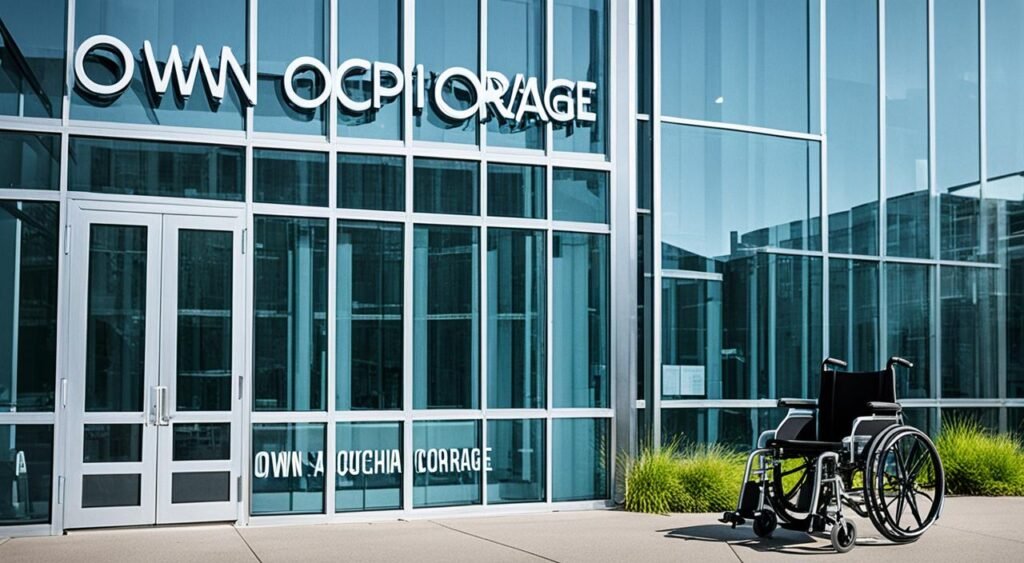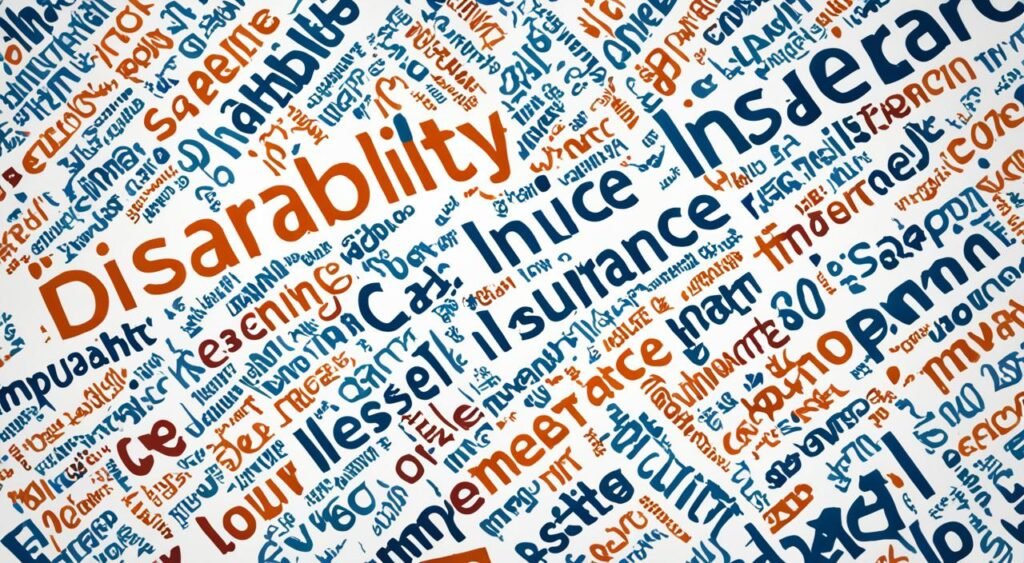Disability insurance is vital for protecting your finances. It helps replace your income if you can’t work because of an injury or illness. Make sure you know the main aspects of disability insurance policies. This way, you ensure you’re covered well. Things like own occupation or residual or partial benefits are crucial. They cater to your specific needs.
Disability insurance from private companies is often more versatile than help from the government, like Social Security Disability. The cost of this insurance varies. It depends on things like qualifying requirements and the amount of money you get back (income replacement ratio), among others. So, knowing what makes a good disability insurance plan is important. It helps keep you financially secure if you become disabled.
Key Takeaways
- Disability insurance helps replace income if you’re unable to work due to injury or illness.
- Key features include own occupation coverage, flexibility and portability, any occupation definition, residual/partial disability benefits, and waiver of premium.
- Private disability insurance policies offer more flexibility and coverage options than government programs like Social Security Disability.
- Factors affecting disability insurance costs include qualifying requirements, income replacement ratio, benefit period, and elimination period.
- Understanding your policy’s coverage is crucial to ensuring you have the right protection in the event of a disability.
Introduction to Disability Insurance
Disability insurance is crucial in protecting your income if you can’t work because of an injury or illness. It safeguards your finances, avoiding hardships if you are not able to work and earn. It’s important to know the definition of disability insurance and its purpose and importance to make sure you’re well covered.
Definition of Disability Insurance
Disability insurance provides money if you can’t work because of a disability. It ensures income even if you’re unable to work. You can get this coverage through public programs like Social Security Disability and private insurers.
Purpose and Importance of Disability Insurance
Disability insurance aims to shield your income from disability’s financial impact. It’s key because it replaces some of your income if you’re unable to work from an injury or illness. This help is vital for staying financially afloat and getting benefits while out of work.
Own Occupation Coverage

Disability insurance often includes a key feature called own occupation coverage. If a policyholder can’t do their current job due to disability, they may still get benefits. This is true even if they could work in another job.
Understanding Own Occupation Definition
The own occupation definition is crucial in disability insurance. It says you’ll get benefits if you can’t do your current job. This is different from insurance that pays out only if you can’t work any job. The other type considers any job you could do based on your education and skills.
Implications of Occupation Changes
If your job changes from what you were insured for, you might not receive benefits. Fixed occupational disability insurance only covers your job when you got the policy. So, it’s vital to check your policy carefully to know the rules about job changes.
Flexibility and Portability

Choosing disability insurance means understanding how flexible and portable your coverage is. This is key if you might switch jobs or careers. It varies for individual and group policies.
Individual vs. Group Disability Insurance
Individual disability insurance offers more flexibility than group disability plans. You can keep an individual policy as you change jobs, unlike with group plans that often end. Also, group plans can change each year based on the employer’s decision and the insurance company.
Maintaining Coverage Through Job Changes
If you have individual disability insurance, you can keep your coverage if you change jobs. This is helpful if you switch careers because your policy still protects your income. As long as you keep up with the premiums, the coverage stays with you. Group coverage doesn’t work the same way, especially if your new job is very different from your old one.
Any Occupation Definition

In some disability insurance policies, “any occupation” defines disability. This means benefits are paid if a policyholder can’t work in any job they are fit for. Whether one can do a job is decided by their education, training, and experience.
It doesn’t mean the policyholder has to accept just any job. The new job should pay as much as the old one they had. This applies to when they first became disabled.
Criteria for Determining Any Occupation
For the “any occupation” definition, age and skill level matter. The insurance company looks at the policyholder’s background. They see if the person can do a job that fits their skills by these standards.
Income Considerations
The insurance also checks if the policyholder can make a decent amount in a new job. The aim isn’t to make them take a much lower paying job. The new job should pay close to what they used to earn based on their ability and experience.
Residual or Partial Disability Benefit
Some disability insurance plans come with a residual or partial disability benefit. This means that if you can only work part-time or do some of your old work, and your earnings drop, you’ll get a part of your disability benefit. It’s key in deciding if you can get benefits and when to ask for them.
Many people with disability insurance don’t know they can use this feature. Imagine you’re too sick or hurt to work as before, but you can do some tasks. This benefit steps in, letting you get paid for the lost part of your income.
Knowing about this benefit is vital for those facing disabilities. It guides them on when to seek help and the process to follow. This applies to all, whether you work for yourself or are under a private plan or state program. This feature is a key part of your disability insurance benefits.
Waiver of Premium Provision
Some disability insurance policies have a special part called the waiver of premium provision. If the person with the policy gets disabled and can’t work, they won’t have to keep paying. The company will stop asking for the monthly payments. This is as long as the person is still disabled and qualifies for the insurance benefits. In simpler terms, the monthly cost of this insurance stops when you can’t work due to a disability.
Private vs. Group Disability Insurance
Private disability insurance usually has the waiver of premium feature. But, group disability insurance schemes might not. This is because when it’s a group plan, the employer often pays all or part of the premiums. Therefore, if someone with a group plan can’t work, they still might need to find a way to pay their share.
Employer-Paid Premiums
If a job includes disability insurance as a benefit, the boss generally takes care of most or all of the premium amount. This makes the policy less flexible for the employee. But, if someone buys private disability insurance on their own, they can set up the policy in ways that suit them best. With personal plans, there’s usually more room for choices and adjustments.
Disability Insurance
Disability insurance is important as it offers financial help if you can’t work in the U.S. You can get it either through public places like Social Security. Or from private companies. It’s crucial to know about the types and what each one covers. This ensures you have enough money if something happens.
Types of Disability Insurance Policies
Short-term disability helps for a brief time, usually up to 6 months, due to injury or illness. It gives you a portion of your salary. Long-term disability insurance lasts longer, aiding those who cannot work for an extended period.
Public vs. Private Disability Insurance
Public and private disability insurance have big differences. Government disability benefits are very straightforward. They follow strict rules on who can get help and offer set benefits. But, private disability insurance gives you more choices. You can pick plans that match your job and how much you earn. This includes possible perks like continuing to pay for your policy when you’re disabled.
When choosing, consider what you need and how much you make. Knowing about these differences helps you choose the best option for your financial safety if you get hurt or sick.
Factors Affecting Disability Insurance Costs
Disability insurance costs vary for many reasons. According to experts, what matters includes the requirements to qualify, how much of your income is replaced, how long the benefits last, and the waiting period.
Qualifying Requirements
The criteria to qualify for insurance affects cost. It looks at your age, health, and job. If you’re seen as a higher risk, you might pay more or face stricter rules to get covered.
Also Read: What Does Your Small Business Insurance Policy Leave Unprotected?
Income Replacement Ratio
How much of your income the insurance replaces is key. Plans that cover 60% or 80% of what you earned before the disability will cost more. Those that pay less cost less.
Benefit Period
The time for which benefits are paid is very important. If your policy pays benefits for a longer time, it will cost more. Policies with a shorter benefit period of maybe five years will cost less.
Elimination Period
The time you have to wait before receiving benefits is crucial. Policies that start benefits sooner, like within 30 or 60 days, cost more. If you can wait 90 or 180 days, the policy is cheaper.
FAQs
Q: What are the key features of disability insurance policies?
A: Disability insurance policies provide insurance benefits to individuals who become disabled and are unable to work. There are different types of disability insurance, such as long-term disability, short-term disability, state disability insurance, and more.
Q: How does disability insurance work for self-employed individuals?
A: Self-employed individuals can purchase disability insurance to ensure they have income protection if they become disabled and are unable to work. They typically need to file a claim with their insurance carrier to receive disability benefits.
Q: What is the waiting period for disability insurance benefits?
A: The waiting period, also known as the elimination period, is the time between when a disability begins and when benefits are paid. It can vary depending on the type of insurance policy.
Q: Who can apply for state disability insurance benefits?
A: Individuals who are unable to work due to a disability may be eligible to apply for state disability insurance benefits. The application process typically involves submitting documentation to support the disability claim.
Q: What are the differences between short-term and long-term disability insurance?
A: Short-term disability insurance provides benefits for a shorter period of time, usually up to a year, while long-term disability insurance offers benefits for a longer duration, sometimes until retirement age. Both types of insurance are designed to provide income protection for individuals who are unable to work due to a disability.
Q: Can individuals who receive unemployment insurance benefits also receive disability benefits?
A: In some cases, individuals who are eligible for unemployment insurance benefits may also be eligible for disability benefits if they become disabled and are unable to work. Eligibility criteria may vary depending on the type of insurance and the circumstances of the disability.
Q: What are the important factors to consider when choosing a disability insurance policy?
A: When selecting a disability insurance policy, individuals should consider the benefits offered, the waiting period, the coverage amount, the premium cost, and any exclusions or limitations. It is important to choose a policy that best fits their individual needs and circumstances.
Source Links
- https://schlawpc.com/blog/5-major-features-of-your-disability-insurance-policy/
- https://www.investopedia.com/terms/d/disability-insurance.asp
- https://www.guardianlife.com/disability-insurance/how-disability-insurance-works

